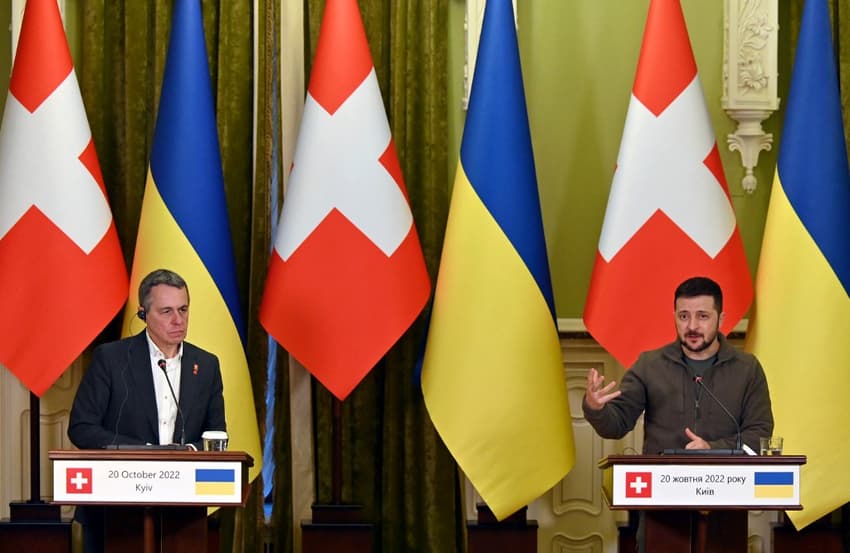Neutrality: Majority of Swiss now back closer ties with Nato

A year after Russia's full-scale invasion of Ukraine, a majority in Switzerland now support closer ties with NATO, the
government said Thursday -- a first in the country known for military neutrality.
The Swiss military academy and the Centre for Security Studies -- both attached to ETH Zurich university -- publish an annual survey of public opinion on foreign, security and defence policy issues, to evaluate long-term trends.
It showed that in January, 55 percent of the Swiss population favoured closer ties with NATO -- up 10 percentage points from the January 2021 survey.
"It is the first time that a small majority of the population has been of this opinion," the defence ministry said in a statement.
"Since the start of the war in Ukraine, the Swiss have become more pessimistic about the future of our country and the world. They also now take a more critical look at neutrality and declare themselves ready for more cooperation," it concluded.
That said, only a third of those questioned backed Switzerland actually joining NATO.
Switzerland's long-standing position has been one of well-armed neutrality and the landlocked country of 8.6 million people has mandatory conscription for men.
The survey found 53 percent thought the principle of neutrality did not preclude Switzerland from planning its military defence in cooperation with NATO.
Switzerland is not a member of NATO but cooperates with the defence alliance within the Partnership for Peace and the Euro-Atlantic Partnership Council, where it can voice concerns on foreign policy and security issues.
The principle of Swiss neutrality is backed by 91 percent, though that figure is down six percentage points from January 2022.
Most Swiss (unchanged at 57 percent) remain in favour of "differentiated neutrality" -- namely that Switzerland remains militarily neutral but takes a different position on the political level.
Switzerland has aligned itself with the sanctions imposed on Russia by the surrounding European Union.
As in a poll conducted in June, a clear majority (70 percent) believe the sanctions are compatible with neutrality.
In recent weeks, Kyiv and its allies have stepped up veiled criticism of Switzerland's position.
Although it has imposed sanctions on Russia, Bern has refused to permit the re-export of Swiss-made weapons to Ukraine.
The LINK institute surveyed 1,238 people by telephone between January 3rd and 20th.
Comments
See Also
The Swiss military academy and the Centre for Security Studies -- both attached to ETH Zurich university -- publish an annual survey of public opinion on foreign, security and defence policy issues, to evaluate long-term trends.
It showed that in January, 55 percent of the Swiss population favoured closer ties with NATO -- up 10 percentage points from the January 2021 survey.
"It is the first time that a small majority of the population has been of this opinion," the defence ministry said in a statement.
"Since the start of the war in Ukraine, the Swiss have become more pessimistic about the future of our country and the world. They also now take a more critical look at neutrality and declare themselves ready for more cooperation," it concluded.
That said, only a third of those questioned backed Switzerland actually joining NATO.
Switzerland's long-standing position has been one of well-armed neutrality and the landlocked country of 8.6 million people has mandatory conscription for men.
The survey found 53 percent thought the principle of neutrality did not preclude Switzerland from planning its military defence in cooperation with NATO.
Switzerland is not a member of NATO but cooperates with the defence alliance within the Partnership for Peace and the Euro-Atlantic Partnership Council, where it can voice concerns on foreign policy and security issues.
The principle of Swiss neutrality is backed by 91 percent, though that figure is down six percentage points from January 2022.
Most Swiss (unchanged at 57 percent) remain in favour of "differentiated neutrality" -- namely that Switzerland remains militarily neutral but takes a different position on the political level.
Switzerland has aligned itself with the sanctions imposed on Russia by the surrounding European Union.
As in a poll conducted in June, a clear majority (70 percent) believe the sanctions are compatible with neutrality.
In recent weeks, Kyiv and its allies have stepped up veiled criticism of Switzerland's position.
Although it has imposed sanctions on Russia, Bern has refused to permit the re-export of Swiss-made weapons to Ukraine.
The LINK institute surveyed 1,238 people by telephone between January 3rd and 20th.
Join the conversation in our comments section below. Share your own views and experience and if you have a question or suggestion for our journalists then email us at [email protected].
Please keep comments civil, constructive and on topic – and make sure to read our terms of use before getting involved.
Please log in here to leave a comment.